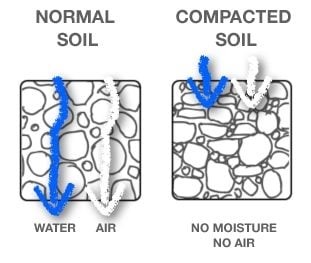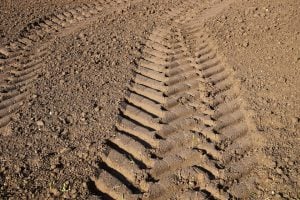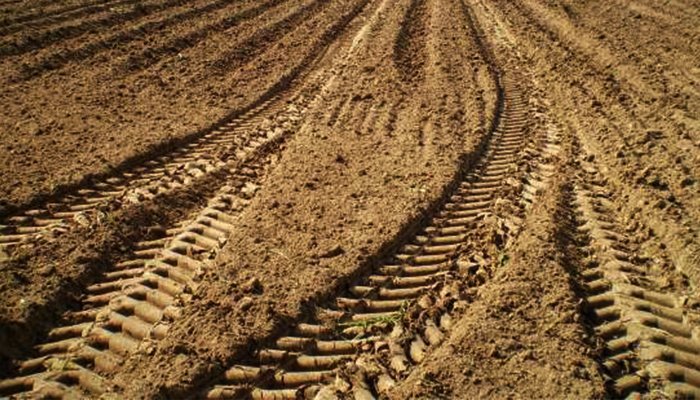A typical soil contains about 50% pore space. The remaining 50% is made up of soil particles and organic matter. When soil is compacted, pore compression occurs. These pores would typically transport vital water and air to roots. When compacted, this transportation is stunted, often resulting in oxygen deficiency and impeding root growth. The density of soil increases during soil compaction because soil weighs more when pores are compressed. Compaction often results in a dense soil with few large pores creating poor internal drainage and limited aeration.
Causes Of Soil Compaction:
-

Photo sourced from ucanr.edu Soil compaction typically occurs from the force of wheel traffic from agricultural machinery.
- Some form of soil compaction will likely be present in any place where humans and machines exist, and where infrastructures that support them are built.
Effects Of Soil Compaction:
- Reduction of available space for air and water resulting in reduced ability for soil to hold water and air (necessary for plant and tree survival)
- Reduced water infiltration – restricts movement of water down through soil and decreased rate of water penetration into the soil root zone
- Increased potential for surface water ponding, runoff, surface soil waterlogging, and soil erosion
- Reduced crops
- Impeded growth
- Roots impeded – soil compaction results in root growth restriction because it decreases the number and size of large pores and it increases the mechanical resistance of the soil through pressing soil particles closely together.
Tree Symptoms That Could Indicate Soil Compaction:
- Poor growth and reduced leaves
- Branch die back
- Susceptibility to pest problems and environmental stress
- Tree not responding to proper care
Reducing & Preventing Soil Compaction:
-

Photo sourced from greenarborists.com Avoid working wet soil – Soil is most susceptible to compaction when it is saturated and cannot absorb more water. Soil compaction will be less when soil tillage, fertilizer application, and planting operations occur in dry conditions.
- Don’t stand or walk in garden beds – This can compact the soil, especially if done on a regular basis.
- Install garden paths or stepping stones – This is a great way to create a designated walking space in your garden that won’t damage plants and compact soil.
- Reduce tillage and feed soil – Tilling your soil is not always necessary and can be damaging, especially in gardens. Consider applying mulch instead.
A good DIY soil compaction test is to stick a screwdriver into your soil. If your soil is compacted it will be difficult to push the screwdriver in. You can also cut out a chunk of soil to see what it looks like. If it is dull, grayish, and dry this could be signs of compacted soil. If soil compaction is a persistent problem, methods of alleviation will be necessary. Consider surface and subsurface drainage improvements, keeping soil covered with vegetation, and avoid working or traffic when soil is wet.
Soil and root care is extremely important to the health of your trees. Your arborists at Red Cedar can help to identify whether your soil is compacted, and offer solutions for alleviation. Contact us today for your free consultation, and let us help properly manage the health of the trees on your property so they thrive!


